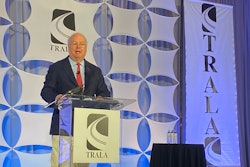
On one side, invoices represent parts sold and services rendered. And, that’s good. On the other side, those same accounts receivable invoices can bring with them a host of time-consuming headaches preventing a dealer or distributor from concentrating on serving its customers. And, that’s bad.
“Our typical customer is focused on selling parts, providing service and running their business,” says Steve Williams, national sales director, Interstate Billing Service (IBS). “Managing receivables represents a huge headache, one which most business owners would prefer to avoid.”
Outsourcing accounts receivable duties to a third party not only enables a business to foist those headaches onto a financial services provider, but there are other positive benefits as well. It’s a switch members of the dealer and aftermarket communities might want to consider if they haven’t already. While running a business, a third party can provide good, eliminate the bad and help companies avoid the ugly.
The good
One of the primary benefits of outsourcing accounts receivable tasks to a third party is quicker access to cash. A business might have 30-day payment terms with customers, for example, but when a sale is made, an accounts receivable service provider takes ownership of that invoice and the distributor can have cash from that sale within two weeks or even the next day, depending on the provider.
“With IBS, it’s as if all your customers are paying your business with a credit card. Simply send us the invoice and we will fund 100 percent, minus our fee, and deliver your money within 24 hours. That is cash you can put back into your business immediately,” says Williams.
This means of quick access to cash is especially attractive to companies in an expansion phase, adds Rebecca De Paula, IBS vice president and national sales manager.
“If a business is in heavy growth mode, access to quick cash is definitely something that attracts people to a service like ours. Unlike a traditional bank loan, IBS will not enforce a cap. We essentially provide as much cash flow as you and your business can sell,” De Paula says.

Outsourcing accounts receivable with a company like IBS “lets you grow as fast as you want to grow because you have instant cashflow every 24 hours. The more you bill, the faster your cashflow comes in and cashflow is king,” Bandimere says.
“If you’re in growth mode, you’re crazy not to,” he adds. “You can just focus on your business. The cash keeps up with us as we keep growing. We’ve gone from a 10,000 sq.-ft. building on one acre to a 50,000 sq.-ft. building on 7.5 acres.”
Having a third party manage accounts receivable comes with other benefits, too. In addition to guaranteeing payment of invoices, Corcentric’s solution provides a website portal for its clients and their customers to view invoices, among other features.
“It’s a repository of all the transactions clients have had with a customer,” says Dave Lindeen, Corcentric senior vice president of sales, financial process automation.
“All of that historical information is stored within our system so both parties, the customer and the distributor, has access to, for example, what business they did last quarter, last month,” Lindeen says. Distributors can run detailed reports of transaction histories and can enable their customers to run reports, too, or limit them to viewing invoices, he adds.
“We are a cloud-based system that’s updated quarterly. You’re bringing a business solution that’s going to give your customer the latest technology and it’s going to make it easier for them to do business with that distributor,” Lindeen says.
Corcentric also is monitoring the financial history of distributors’ customers to assist with changes to their business. For example, a customer might have an unusually high number of trucks that need servicing one month. Corcentric will notice this and raise the credit limit for that customer.
The bad
In addition to the positives of getting paid quicker, enabling businesses to grow and provide reporting capabilities, outsourcing accounts receivable also reduces or eliminates the negative aspects of performing it in-house.
The initial benefit of outsourcing accounts receivable businesses likely will notice is the time saved and the unneeded staff.
“It’s super time consuming,” says Bandimere. “We’d need a staff of three people for calling customers, sending and re-sending invoices, answering questions customers have about their statements, checking on payment, processing payments. It’s a lot of work.”
Another benefit of outsourcing accounts receivable is reducing financial risk for the parts and service provider. And that risk can take the form of extending credit to customers or when expanding the business.
If businesses do their accounts receivable in-house, they will have the customers fill out a credit application and then have to vet those customers themselves to determine their credit limits or if they should even have an open account, says Vic Watson, DSI Solutions CEO.
DSI Solutions is a business management system provider for independent repair shops and parts distributors, medium- and heavy-duty truck dealers and trailer dealers. DSI, recognizing the many advantages of outsourcing accounts receivable, formed a strategic alliance with IBS approximately four years ago and fully integrated with them. For DSI clients that are IBS customers, DSI automatically sends its clients’ invoices to IBS electronically. When the payment comes through the next day, DSI processes all the payments against its clients’ customer accounts, Watson says.
“One way I explain risk is to ask a distributor what would happen if they sell a product worth $5,000 to a customer and 30 days later that customer closes their doors. They’re gone and you don’t recuperate your money because you extended 30 day-terms to them,” Williams says. “With IBS, that loss would be on us because we assume the risk for you. From a risk standpoint, that’s a huge advantage with our program.”
Another way IBS mitigates risk is when companies are expanding into new markets with which they might not be completely familiar. A bank typically will provide 60 to 70 percent of receivables on a line of credit and, if the company is doing well, the bank won’t increase the credit until it is able to review a full year of financial statements, Williams says.

The ugly
Outsourcing to a third party eliminates the ugly side of accounts receivable duties, such as chasing down delinquent payments, and makes addressing disputed invoices easier.
Doing accounts receivable in-house means having to handle all of the collection activity. “You have to make the collection calls; you have to be the bad guy. All of that disappears,” Watson says.
Williams concurs. “Switching from a business that sells to a business that has to collect on late payments can put anyone in an uncomfortable position. Nobody likes to be the collector; nobody likes to be the bad guy and ask for payment on something they sold 45 days ago,” says Williams. “IBS steps in and follows up on receivable duties.”
Bandimere says outsourcing freed up a lot of time for his sales staff and helped them avoid uncomfortable discussions about unpaid invoices.
“As a sales rep or an owner you never want to call a customer to have that type of conversation, which can get a little tough. You get removed from that completely because it’s a third party handling it,” he says.
“Clients aren’t chasing someone who’s not paying them, so they’re able to focus on their business of making sure their customers’ trucks get fixed and back on the road,” Lindeen says.
And in the event of a disputed invoice, companies like IBS and Corcentric act as the middle man.
“If the customer says to us there’s an issue with an invoice, then we work with the distributor to get the issue solved,” Lindeen says.
IBS handles disputes similarly, acting as a neutral party. “If a customer has an issue with an invoice, IBS communicates that to us via email and we address it and get our response back to IBS, which immediately sends that information back to the customer and everything moves along,” says Bandimere.
“The flow of information is faster” with the third party versus using MDI Truck Parts and Service staff to handle these issues in-house — and customers are satisfied with the response time, he adds.
“The biggest thing as a business owner is [outsourcing accounts receivable] lets you focus on your business and grow and not play the money game,” Bandimere says. “Don’t try to do stuff outside your wheelhouse. Focus on what you’re good at and don’t be the bad guy.”










